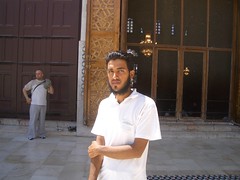 |
| Communist Party of Indonesia (Photo credit: Wikipedia) |
 |
| English: Suharto, second President of the Republic of Indonesia, at the start of his sixth term (Photo credit: Wikipedia) |
It was one of the bloodiest massacres of the 20th century, well hidden from the outside world - the systematic killing of communists or alleged communists in Indonesia in 1965 and 1966. Researchers estimate that between one and three million people died.
The killers have always considered themselves heroes because their acts were supported by the government and large parts of society. Many executions were directly committed by the military. In the years that followed, Indonesians were bombarded with anti-communist propaganda and, until today, most people do not know what really happened. The film, and a recent report by the Indonesian national human rights commission that called the killings crimes against humanity, have launched a new debate on how the country should deal with this very traumatic past. Mass graves have yet to be exhumed and victims are yet to see some kind of justice. In many villages, killers and victims' relatives are still living with the awkward reality that 'our neighbour has killed my father'. Al Jazeera's Step Vaessen talks to former executioners and finds out why so many people - mostly Muslim youths - turned into cold-blooded killers, and why this dark episode in Indonesian history is still very sensitive and alive today.
By Syarina Hasibuan, producer When a friend told me of a documentary about an executioner involved in the killing of alleged communists in 1965, I did not believe her. I had never heard of anyone confessing to this - let alone a documentary about it screening at international film festivals. I was dying to see it and, luckily enough, I was one of the first Indonesians, along with a small group of journalists, to attend a secret screening of The Act of Killing in Jakarta. We were told not to reveal the location of the screening for security reasons, which reveals just how sensitive this bloody period in Indonesian history remains today. After I watched it I felt shocked, confused and betrayed. Shocked to find out how horrible the situation was at that time - with people living in fear and killings taking place everywhere, every day. Confused because I did not know what to think of Anwar Congo, the executioner in the film. Somehow I did not hate him because I saw him as an uneducated man, brainwashed by the government into believing that he was doing the right thing by killing all those people. It was clear that his actions haunted him for life. I felt betrayed because the government never told us the real story when I was growing up. They lied to us. And now I wanted to know more. As an Indonesian who grew up during President Suharto's 'New Order' regime, I was taught that the Indonesian Communist Party (PKI), which was one of the biggest political parties in 1965, was violent and that its members did not believe in God. When I was a child, if we hated someone we used to call him or her a communist - meaning that we thought the person was evil. That is how brainwashed I was. In elementary school every year on September 30, teachers would ask us to watch a three-and-a-half hour long government sponsored film about how the Communist Party had planned to topple the government. The film showed how, on one day in 1965, the PKI had kidnapped seven top military men in the middle of the night, killed one of them in front of his wife and children, and brought the others to a rubber plantation, where they tortured and mutilated them. Throughout it all, they were singing, dancing and shouting "Kill! Kill! Kill!". Then they threw the dead bodies into a well. Many of the scenes in that film were too violent for elementary school students to watch. But I guess the aim was to brainwash the younger generation, to imprint the most gruesome parts of that film onto our brains so that whenever we heard of the PKI we thought of evil. And, for a long time, it worked. I grew up not understanding what actually happened in 1965; I did not know that maybe up to three million people had been killed because they were accused of being involved in the PKI. If my parents or grandparents knew about it, they never spoke of it. After watching The Act of Killing I felt we should make our own story about the killings. I talked to victims, executioners, witnesses and investigators to find out more about what actually happened. And the more I talked to people, the more gruesome the picture that formed in my head. After the military accused the PKI of being behind the murder of the seven military men, PKI members all over Indonesia were hunted down, put in prison without trial, tortured or killed. Civilians and students from religious boarding schools were used as executioners. And the military released some of the most violent criminals from prisons and ordered them to carry out executions. Hundreds of dead bodies were found floating in rivers every day. The situation was so chaotic that a person could easily be accused of being a PKI member simply because someone did not like them. Killings even happened between family members. Ndoren is an old man who does not know his real age. He has only two teeth left, but smiles a lot. He told us he was an executioner. We went with him to Luweng Tikus, or the Rat hole as local people call it - the location where soldiers forced him to kill more than 40 people, some of whom he knew personally. In front of the 42 metre deep hole he told us his story, continuously warning us not to go any closer. The alleged communists were brought in by the military after walking in the dark for hours, with their hands tied. They were lined up in front of the hole. Then, one by one, Ndoren hit each of them on the back of the head with a crowbar and threw them into the hole. He said they hardly struggled, as if they had already accepted that they were going to die. The stench from the hole was so bad that villagers far away could not bear it. The hole was covered until 2002 when human rights activists opened it up and found human bones and skulls inside. After Suharto's downfall 14 years ago, people cautiously started to speak out. Victims and human rights organisations asked the government to at least apologise for what happened. Nearly 50 years after the events of those years, the National Commission for Human Rights conducted a four-year long investigation into the case and concluded that crimes against humanity were committed and that the military was responsible. Still nothing much changed. I am happy that elementary school students no longer have to watch the same propaganda film we were forced to endure. But Indonesia's 'killing fields' remain absent from the history books. The communists are still considered devil-like in the eyes of many Indonesians and grandchildren of Communist Party members still do not want to admit to this in public. There are still those who prefer not to talk about what happened in 1965. Why open up old wounds, they say. Let us keep it buried. But there are also many Indonesians, like myself, who want to know what really happened. What is it that has divided our country for so long? Did the PKI really plan a coup and kill those army generals, even though their position was so strong at the time? What was it that made my fellow Indonesians so willing to kill one another that they would even execute family members? I am happy that they have partially excavated Luweng Tikus and found the skeletons. But many others remain scattered across Indonesia. And we have a long way to go before we have all the answers we deserve. I believe that if we want to learn from the past we must know the truth about our history. |
http://www.aljazeera.com/programmes/101east/2012/12/2012121874846805636.html?fb_action_ids=587360297947317%2C587350067948340%2C587349914615022&fb_action_types=og.recommends&fb_ref=.UOUqSp7k3O4.like%2C.UOUpqiDtNOc.like&fb_source=other_multiline&action_object_map=%7B%22587360297947317%22%3A111004919069572%2C%22587350067948340%22%3A10152076177310451%2C%22587349914615022%22%3A310521925730962%7D&action_type_map=%7B%22587360297947317%22%3A%22og.recommends%22%2C%22587350067948340%22%3A%22og.recommends%22%2C%22587349914615022%22%3A%22og.recommends%22%7D&action_ref_map=%7B%22587350067948340%22%3A%22.UOUqSp7k3O4.like%22%2C%22587349914615022%22%3A%22.UOUpqiDtNOc.like%22%7D
http://www.youtube.com/watch?v=M9oebCcE6-k Video

























